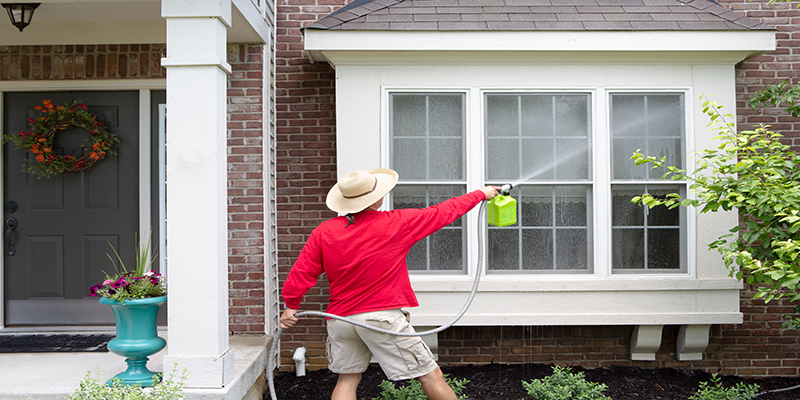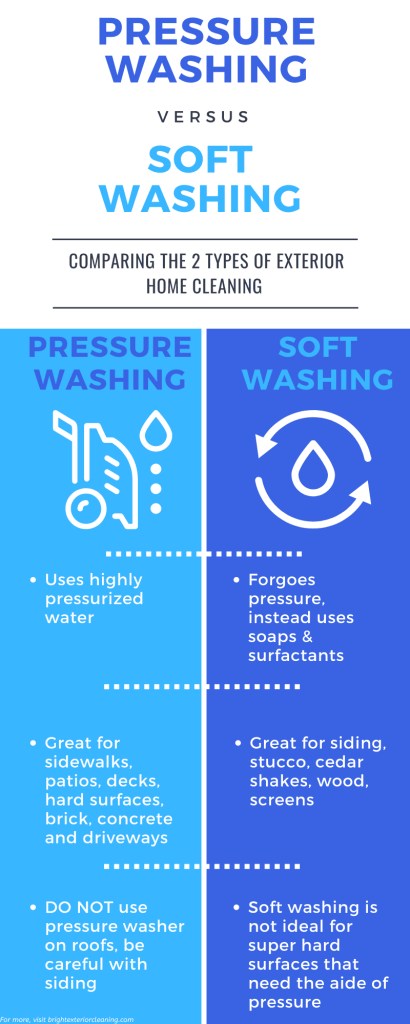A soft wash pressure washer uses low pressure combined with specialized cleaning solutions to safely clean surfaces. It effectively removes dirt, algae, and mold without damaging delicate materials.
Soft wash pressure washers are ideal for cleaning surfaces like roofs, siding, and decks. Unlike traditional pressure washers, they apply a gentle stream of water mixed with eco-friendly detergents. This method ensures thorough cleaning while protecting fragile surfaces. Homeowners and professionals appreciate soft washing for its effectiveness in removing grime and preventing mold growth.
Choosing the right soft wash system can extend the life of your surfaces and enhance curb appeal. Understanding the benefits and applications of soft washing will help you maintain your property effectively. Whether for residential or commercial use, soft washing is a sustainable cleaning solution.

Credit: washh.com
Page Contents
- 1 Introduction To Soft Wash Pressure Washing
- 2 Key Components Of A Soft Wash System
- 3 The Science Behind Soft Washing
- 4 Benefits Of Soft Wash Pressure Washing
- 5 Common Applications For Soft Wash Systems
- 6 Step-by-step Guide To Soft Washing
- 7 Maintenance And Care For Soft Wash Equipment
- 8 Professional Soft Wash Services Vs. Diy
- 9 Future Of Soft Wash Technology
- 10 Frequently Asked Questions
- 11 Conclusion
Introduction To Soft Wash Pressure Washing
Soft wash pressure washing is a cleaning method that uses low-pressure water. It combines a special cleaning solution to remove dirt and grime. This technique is perfect for delicate surfaces like roofs and siding.
Unlike traditional pressure washing, soft washing does not damage surfaces. Traditional methods use high-pressure water, which can cause harm. Soft washing effectively cleans while protecting your home.
| Feature | Soft Washing | Traditional Pressure Washing |
|---|---|---|
| Pressure Level | Low | High |
| Surface Safety | Safe | Risk of Damage |
| Cleaning Solution | Yes | No |
| Best For | Delicate Surfaces | Sturdy Surfaces |
Key Components Of A Soft Wash System
Low-pressure nozzles are essential for a soft wash system. They spray cleaning solutions gently. This method protects surfaces from damage. Soft washing works well on roofs and delicate materials.
Chemical mixers and solutions mix cleaning agents safely. They ensure the right balance for effective cleaning. Using the right chemicals helps remove dirt and grime without harming surfaces.
Specialized pumps and equipment are crucial for soft washing. These pumps maintain low pressure while delivering solutions. They help achieve a thorough clean with less risk of damage.
The Science Behind Soft Washing
Soft washing uses a mix of cleaning agents and low-pressure water. This method is safe for surfaces. Chemistry plays a key role in how these agents work. They break down dirt and stains effectively.
Surfactants are important in soft washing. They help the cleaning solution stick to surfaces. This allows for better cleaning without high pressure. Low pressure means less risk of damage. It is gentle on roofs, siding, and other materials.
| Cleaning Agent | Function |
|---|---|
| Surfactants | Reduce surface tension for better adhesion |
| Bleach | Kills mold and mildew |
| Detergents | Break down grease and grime |

Credit: www.angi.com
Benefits Of Soft Wash Pressure Washing
Soft wash pressure washing is safe for delicate surfaces. It uses low pressure and special cleaners. This prevents damage to roofs, siding, and decks. Many people choose this method for their homes.
Using eco-friendly cleaners helps protect the environment. Soft washing reduces water usage compared to traditional methods. Fewer harmful chemicals enter the water supply, making it a better choice for nature.
The cleaning results from soft washing last longer. Algae, mold, and dirt are removed effectively. This means surfaces stay clean for a long time. Homeowners save time and money on frequent cleanings.
Common Applications For Soft Wash Systems
Soft wash systems are perfect for residential cleaning projects. They gently clean surfaces like decks, patios, and fences. This method protects plants and pets from harsh chemicals.
For commercial property maintenance, soft washing is effective. It safely cleans buildings, sidewalks, and parking lots. This keeps properties looking fresh and inviting.
Roof and siding preservation is another key use. Soft washing prevents mold and algae growth. This extends the life of roofs and sidings, saving money in the long run.

Credit: www.nashvillecleanwindows.com
Step-by-step Guide To Soft Washing
Start by removing any obstacles from the area. This includes furniture, plants, and decor. Make sure to cover anything that might get damaged.
Choosing the right cleaning solution is important. Use a mixture of water and a gentle detergent. Avoid strong chemicals that can harm surfaces.
For soft washing, use a low-pressure spray nozzle. This will prevent any damage to the surface. Move the nozzle in a side-to-side motion for even coverage. Rinse the area well after cleaning.
Maintenance And Care For Soft Wash Equipment
Regular cleaning keeps your soft wash pressure washer in top shape. Remove dirt and debris after each use. Check the nozzles for clogs, ensuring smooth operation. Regularly inspect the hoses for any signs of wear or damage.
Store the equipment in a dry place to prevent rust. Use a protective cover to shield it from dust. Follow the manufacturer’s guidelines for any specific maintenance tips.
For common issues, check the water supply first. Low pressure often means a clogged filter. If you hear strange noises, inspect the pump for damage. Ensure all connections are tight to avoid leaks.
Professional Soft Wash Services Vs. Diy
Soft washing is a great choice for cleaning delicate surfaces. Professionals know the right techniques and solutions. They can safely clean roofs, decks, and siding. Hiring experts ensures no damage occurs during the process. Complex jobs are best left to trained professionals.
For those who enjoy DIY projects, soft washing can be done at home. Use a low-pressure washer and safe cleaning solutions. Make sure to protect plants and windows before starting. Always follow safety precautions and wear protective gear.
Check the weather before beginning your project. Avoid washing on windy or rainy days. Take your time and work in sections for the best results.
Future Of Soft Wash Technology
Soft wash technology is advancing quickly. New innovations improve efficiency and effectiveness. Modern equipment now uses less water while cleaning better.
Companies focus on eco-friendly solutions. They create cleaning agents that are safe for the environment. Many products now use biodegradable materials. This helps to reduce pollution.
| Innovation | Benefit |
|---|---|
| Low-pressure systems | Protects surfaces from damage |
| Smart technology | Adjusts cleaning based on surface type |
| Eco-friendly detergents | Minimizes environmental impact |
Frequently Asked Questions
What Is A Soft Wash Pressure Washer?
A soft wash pressure washer uses low pressure to clean surfaces. It combines water with special cleaning solutions to remove dirt, mold, and algae. This method is gentler on surfaces compared to traditional pressure washing. It’s ideal for delicate materials like roofs, siding, and painted surfaces.
How Does A Soft Wash Pressure Washer Work?
Soft wash pressure washers operate by mixing water with cleaning agents. These agents break down grime and biological growth. The system then delivers this solution at low pressure, ensuring safe and effective cleaning. This method helps preserve the integrity of surfaces while achieving a thorough clean.
What Surfaces Can Be Cleaned With Soft Washing?
Soft washing is suitable for various surfaces, including roofs, siding, and decks. It’s particularly effective on porous materials that can be damaged by high pressure. This method also works well on outdoor furniture and fences. Always test a small area first to ensure compatibility.
Is Soft Washing Safe For My Roof?
Yes, soft washing is safe for most roofs. It minimizes the risk of damage associated with high-pressure washing. The cleaning solutions effectively eliminate mold and algae without harming shingles. Regular soft washing can extend the lifespan of your roof while maintaining its appearance.
Conclusion
A soft wash pressure washer is an effective tool for delicate surfaces. It combines low pressure with specialized cleaning solutions. This method ensures thorough cleaning without damage. Ideal for roofs, decks, and siding, it provides excellent results. Investing in this equipment can enhance your cleaning routine and protect your property’s integrity.

